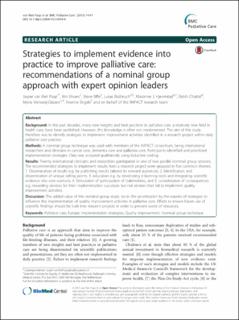| dc.contributor.author | van Riet Paap, Jasper | |
| dc.contributor.author | Vissers, Kris | |
| dc.contributor.author | Iliffe, Steve | |
| dc.contributor.author | Radbruch, Lukas | |
| dc.contributor.author | Hjermstad, Marianne Jensen | |
| dc.contributor.author | Chattat, Rabih | |
| dc.contributor.author | Vernooij-Dassen, Myrra | |
| dc.contributor.author | Engels, Yvonne | |
| dc.date.accessioned | 2020-07-16T11:22:51Z | |
| dc.date.available | 2020-07-16T11:22:51Z | |
| dc.date.created | 2015-11-19T08:14:09Z | |
| dc.date.issued | 2015 | |
| dc.identifier.issn | 1472-684X | |
| dc.identifier.uri | https://hdl.handle.net/11250/2669267 | |
| dc.description.abstract | Background
In the past decades, many new insights and best practices in palliative care, a relatively new field in health care, have been published. However, this knowledge is often not implemented. The aim of this study therefore was to identify strategies to implement improvement activities identified in a research project within daily palliative care practice.
Methods
A nominal group technique was used with members of the IMPACT consortium, being international researchers and clinicians in cancer care, dementia care and palliative care. Participants identified and prioritized implementation strategies. Data was analyzed qualitatively using inductive coding.
Results
Twenty international clinicians and researchers participated in one of two parallel nominal group sessions. The recommended strategies to implement results from a research project were grouped in five common themes: 1. Dissemination of results e.g. by publishing results tailored to relevant audiences, 2. Identification and dissemination of unique selling points, 3. education e.g. by developing e-learning tools and integrating scientific evidence into core curricula, 4. Stimulation of participation of stakeholders, and 5. consideration of consequences e.g. rewarding services for their implementation successes but not services that fail to implement quality improvement activities.
Discussion
The added value of this nominal group study lies in the prioritisation by the experts of strategies to influence the implementation of quality improvement activities in palliative care. Efforts to ensure future use of scientific findings should be built into research projects in order to prevent waste of resources. | en_US |
| dc.language.iso | eng | en_US |
| dc.publisher | BMC (part of Springer Nature) | en_US |
| dc.rights | Navngivelse 4.0 Internasjonal | * |
| dc.rights.uri | http://creativecommons.org/licenses/by/4.0/deed.no | * |
| dc.title | Strategies to implement evidence into practice to improve palliative care: Recommendations of a nominal group approach with expert opinion leaders Ethics, organization and policy | en_US |
| dc.type | Peer reviewed | en_US |
| dc.type | Journal article | en_US |
| dc.description.version | publishedVersion | en_US |
| dc.source.volume | 14 | en_US |
| dc.source.journal | BMC Palliative Care | en_US |
| dc.source.issue | 1 | en_US |
| dc.identifier.doi | 10.1186/s12904-015-0044-9 | |
| dc.identifier.cristin | 1290654 | |
| dc.description.localcode | © 2015 van Riet Paap et al. Open Access This article is distributed under the terms of the Creative Commons Attribution 4.0 International License (http://creativecommons.org/licenses/by/4.0/) | en_US |
| cristin.ispublished | true | |
| cristin.fulltext | original | |
| cristin.qualitycode | 1 | |

